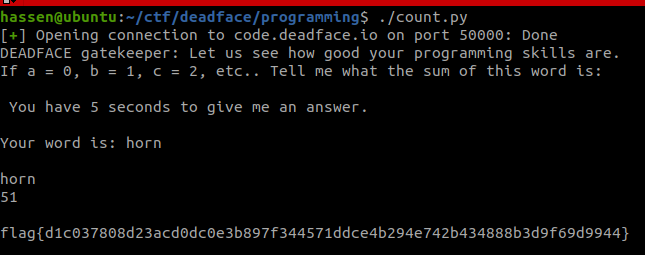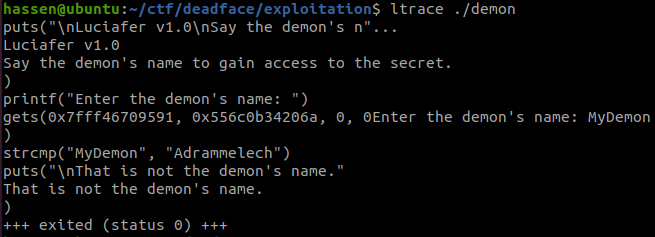This weekend (October 17 2021) I participated in DEADFACE CTF 2021 edition. An event brought to by CyberUp, Cyber Hacktics, and United States Air Force veterans in support of National Cyber Security Awareness Month.
I really enjoyed this CTF, especially the accessiblity of challenges for beginners and the smooth graduation of difficulities through different challenges. I wish I had more time to try all the different challenges proposed.
Task: We are given a hostname and a port, and we need to find a flag.
First thing to do, a simple netcut to that server nc code.deadface.io 50000.
The servers return us a word and wants us to calculate the sum of the word. If a = 0, b = 1, c = 2, etc.. Tell me what the sum of this word is ?
We have to do that in less than 5 seconds.
For that I developed a Python script using pwn library to make socket communication with the server.
#!/usr/bin/env python3
from pwn import *
import re
def count(word):
sum = 0
for ch in word:
sum += ord(ch) - 97
return sum
r = remote("code.deadface.io", 50000)
while True:
string = r.recv(1024)
string = string.decode("utf-8")
print(string)
word = re.search("Your word is: (.*)\n", string).group(1)
print(word)
print(count(word))
word_count = count(word)
r.send(str(word_count).encode())Task: We are given a ELF file that demands to put the correct demon name in order to print the flag.
First, I have tried strings on that file. Nothing special was found.
So, I used ltrace to find the strcmp function.
ltrace ./demon
Task: We are given a hashed password and we need to crack it.
I used John The Ripper to crack the hashed password using Rockyou dictionnary:
john --wordlist=/opt/wordlist/rockyou.txt hashed_passwords.txt
PS : to show previously hacked passwords with John The Ripper :
john --show hashed_passwords.txt
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
Task: We need to crack a password of a user, given her answers to some personal questions.
Disclaimer: I wasn't able to crack the password, but I will share my approach anyways.
First, I put all the personal anwsers in a text file (I used an online OCR to make things faster). I tried to use john using that text file dictionnary. But, it didn't work.
Then, I tought to make a new dictionary file that combines words from her personal answers. That's called a combinator attack.
Contrary to hashcat, john doesn't handle combinator attacks within it. I looked for tools to be able to generate the new dictionnary. I found a list of different tools here
Personnaly, I used princeprocessor to generate the new dictionnary.
Unfortunately, john wasn't able to crack the password again. Maybe, I need to handle uppercase and lowercase to solve that..
Usefull resource Write up by TheZealOt (creator of ctf)



